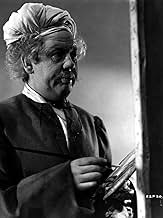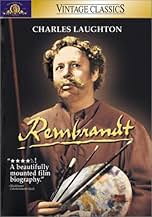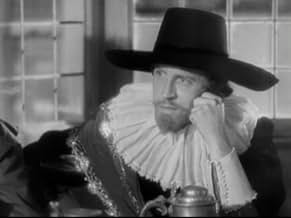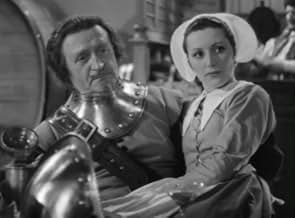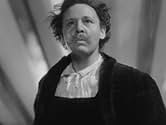Ajouter une intrigue dans votre langueThe respected painter takes to drink and faces down scandal after his wife dies.The respected painter takes to drink and faces down scandal after his wife dies.The respected painter takes to drink and faces down scandal after his wife dies.
- Réalisation
- Scénario
- Casting principal
- Récompenses
- 1 victoire au total
Avis à la une
In 1936, the great age of the Studio System, Alexander Korda produced and directed "Rembrandt," a sprawling and somewhat disjointed portrait (pun intended) of Rembrandt van Rijn. Charles Laughton alternates as a boisterous or then somewhat subdued Rembrandt. He loses his wife to illness and then takes up with a domestic, Geertje, played by Gertude Lawrence. Lawrence is fine as a woman who combines common sense with hectoring but who, in the process, sacrifice's the relationship's initial passion to hnadling daily burdens.
This Rembrandt has no idea that in the future his paintings will be quite desired by museums and thieves, including celluloid ones. He paints, he proclaims, what he sees and not what his patrons want. A huge painting of the Civic Guard is unveiled to shock and denunciations as, Goyaesque, the contributors to the fund for the painting see themselves savagely lampooned.
A new model, Hendrickje, charmingly acted by a beautiful and youthful Elsa Lanchester, steals Rembrandt's heart and body, leaving the long suffering Geertje out in the cold.
Rembrandt's relationship with Hendricktje is the most charming part of a film that blends unconvincingly connected scenes together. There's too much noise: Rembrandt paints, Rembrandt drinks (a lot), Rembrandt is hounded by creditors, Rembrandt runs back to dad. Laughton's acting carries the film and when he occupies center stage he is never less than attention-grabbing. But this isn't the Charles Laughton of "Mutiny on the Bounty," there a riveting character. Laughton's Rembrandt is a fellow one might care to sip smooth Holland gin with but he's no character with a deep soul inviting speculation and drawing the best from a great actor.
"Rembrandt" is a studio product well representative of its time. On that basis it merits enjoyable viewing.
8/10.
Alexander Korda, the founder of London Films, appears to be an altogether intriguing personality in cinema history. Brian Eggert in his Deep Focus review nicely observes that he frames his characters "in a way that personalizes the drama, seeing them as people and not dry historical figures." How beautifully this notion occurs to manifest itself in this picture. His REMBRANDT is a movie which is far from any biographical approach but rather stands out as an insight into an artist tormented by conflict between the gravity of 'properly social' requirements and the eagle's wings of inspirations - a genius whose life and work are far from 'too picturesque' traditionalized sweetness. Therefore, Emerson's quote, which I entailed at the beginning of my review, seems to correspond to that development which we find in this barely 'ornamented' 80 minute-long film.
The fact that Korda's movie boasts of many charming moments, beautiful camera shots, dazzling costumes and stunning cinematography remains pretty indisputable. Although the recreation of the Amsterdam of the time does not occur to be fully satisfactory due to certain lacks of possibilities at hand, the interiors make for artistic impressions. The cinematographer Georges Perinal powerfully employs his efforts to combine visual with overtones (consider Rembrandt's indicative love scene with his wife to come, the shadows, the name of his desire written on the table and the ever present storm that sets the tone for the sensually typical moments on the screen). But it is not where the film's triumph really lies.
When seeing the film nowadays, it seems that we are watching quite a modern approach to the 'interpretations' of an artistic personality. The movie, as I have mentioned before, does not focus on descriptive approach of Rembrandt's paintings but rather on the protagonist who speaks his mind, shares what lies deep down his heart. In this way, it's not just like "I am going to present to you a life of an artist" but he invites a viewer for a fruitful discourse of perceptions. Of course we could quarrel here to what extent it is the historical Rembrandt. Ignoring some cinematic liberties taken with the genial leading hero of art, we are at least supplied with a vibrant, vital, engrossing image of a man who grows in both skill and thought. Isn't that what many of us long for in movies?
Apart from flawlessly delivered biblical verses corresponding to his life experience, Rembrandt (Charles Laughton) shares with us his thoughts about life, women, social status, success, his vision of the 'caged' world. His inner dictates allow him to reveal himself, his struggles between vision and reality, 'women' and 'wives,' conventions and Love. As the movie skips all glorification, all baseless idealization or illusionary assumptions, we may 'properly' talk about the movie in terms of Korda's revolutionary approach along with Laughton's revelatory portrayal that deeply focus on the humanity of character. This 'humanization' refers to many scenes from the frequently discussed rejection of THE NIGHT WATCH when Rembrandt powerfully makes it clear to everybody that he wanted to 'paint men. Soldiers. Company marching out' instead of glorified 'gentlemen of rank and position' through his encounter with one of his 'lowest of the low' subjects of painting, a beggar (played by Roger Livesey) along with the lesson both learn from each other, Rembrandt's visit at his hometown Leyden where he aims at recognizing his sense of belonging and hopes to restore his sense of attachment... Concluding from the turmoil, an artist belongs nowhere but his inner individualized existence.
In one scene, Rembrandt says: "Every man is a destined path." Nowhere does it appear as clear as in his relation to WOMEN. He seems to be in love with his wife Saskia (whom we actually never see on screen) but as soon as we appreciate the witty verses in a skillful game of words, funeral chimes toll over the windowed husband mourning and grief. In one moment when he tries to forget the sorrows, he spills the beans about the inner desires (I need a woman I can call my wife) and, unreasonably, gets married to his housekeeper Geertje Dirx (Gertrude Lawrence). However, she symbolizes all that is 'material' and 'down-to-earth' in a subtle man's perception of a woman. "Use your common sense" seems to be the slogan that does not only takes hold of her but which also interrupts the artist's great moment of inspiration. As a cure comes a young and beautiful Hendrickje Stoffels. Strikingly similar in looks to the artist's wife, she inflames jealousy within the envious woman and the Sanhedrin-like assembly of accusers. Within the moral and financial hazards, the love of the two does not find obstacles serious enough to spoil their feelings.
ELSA AND CHARLES supply the movie solely with power scenes of unique chemistry. Brian Eggert memorably points out that "Laughton's busy hands and eyes create an observant, thoughtful character" being "bold yet timid and modest, as only a poor but gifted genius could be." However, he shines fully at Elsa's side Their most unforgettable scene shows them 'recreate' their first meeting when he looks at her as both and artist and a man. With its height of emotions within 'from the inside out' method, derived from Stanislavskyan school, the moment beautifully addresses human longing for the possibility to experience the happiest moments of life once again. Yet, at the same time, it draws parallels with an intriguing assumption that true love is the only source of happiness in anyone's life.
A highly worth seeing movie about a man whose was a destined path and yet a man whose modest approach derived from Solomon's words of wisdom have resulted in transcending portraits that still personify absorbing developments of artists tormented by storms yet touched by the grace of talent...and inspiration growing in a ray of enlightenment.
The story takes us through Rembrandt's sad life, and manages at the same time to leave out a lot of sadness. The film shows his son Titus, but there were several other children who did not survive. The great tragedy of Rembrandt's life was the death of his wife Saskia, whom he painted often. Rembrandt was also known for asking Jews to pose for his Old Testament paintings, which are informed by his knowledge of the Bible.
There were two other women in Rembrandt's life: his common-law wife Hendrickje Stoffels (Elsa Lanchester) and his housekeeper, Geertje Dirx (Gertrude Lawrence) who evidently became his lover. She later sued Rembrandt for breach of promise, and he had to pay her 200 guilders a month. For years he tried to get her committed.
Rembrandt is shown falling into poverty here. When his fortunes dimmed as an artist, he continued to work as a teacher. Bad investments were the main cause of his problems. In truth, his paintings remained popular throughout his lifetime, and the one for which he is chastised in the film actually was a huge hit.
Laughton portrays Rembrandt as a man of tremendous artistic integrity, a learned man with soul, heart, and a great feeling for language. Indeed, Laughton's monologues are absolutely beautiful; had he read the phone book, I would have been just as enraptured. Elsa Lanchester is very young here, all eyes, and gives a very sweet performance as the frail Hendrickje. Gertrude Lawrence is an absolute spitfire as Geertje.
Wonderful film. Don't miss this breathtaking Laughton performance.
Later biographical pictures, Lust for Life about Van Gogh and Moulin Rouge about Toulouse-Lautrec had good location photography going for them. Alexander Korda did create some nice sets to depict the Netherlands of the 17th century, but it just isn't the same.
Another difference between Rembrandt and the other two later pictures is while Van Gogh and Toulouse-Lautrec died young, Rembrandt lived to be an old man by the standards of his century. The film takes us on a forty year journey of his life from the death of his first wife until just before he dies. Laughton is great at capturing Rembrandt at every stage of his life.
As compared to those other two 19th century artists, Rembrandt's life was also not the tormented one the others had. Rembrandt is not a deformed cripple like Toulouse-Lautrec nor is he dealing with the onset of mental illness like Van Gogh. Tragedy happens in his life, but the tragedy isn't out of his own character.
Like the other two Rembrandt was constantly plagued with money problems. That's actually what takes up most of the film, the compromises he makes with his artistic vision and the need he has to put bread on the table.
Gertrude Lawrence and Elsa Lanchester do fine as the two women in his life. Laughton and Lawrence did not get along during the making of Rembrandt, that may have helped give their scenes some real bite. Three members of the performing Livesey family are in this film and Roger Livesey is a standout as the beggar who Rembrandt uses to paint his portrait of King Saul from the Old Testament.
Rembrandt is a finely crafted piece of film making and Charles Laughton gives one of his best screen performances. I wish though it had been done on location the way Lust for Life and Moulin Rouge were.
Le saviez-vous
- AnecdotesSam Livesey, the father of three other actors in this movie--Roger Livesey, Barry Livesey, and Jack Livesey--died the day after this film was released in London.
- GaffesWhen Rembrandt reveals the newly completed painting, 'The Night Watch', we see not the full, original version that he in fact painted, but the drastically butchered version that was made over 40 years after his death, when the painting was moved from its original exhibition space in the Kloveniersdoelen to a less capacious display space in the Amsterdam Town Hall in 1715.
- Citations
Rembrandt van Rijn: And of a sudden he knew that when one woman gives herself to you, you possess all women. Women of every age and race and kind, and more than that, the moon, the stars, all miracles and legends are yours. Brown-skinned girls who inflame your senses with their play, cool yellow-haired women who entice and escape you, gentle ones who serve you, slender ones who torment you, the mothers who bore and suckled you; all women whom God created out of the teeming fullness of the earth, are yours in the love of one woman.
- Crédits fousOpening credits prologue: In the seventeenth century Holland was a world power, her ships carried treasure to Amsterdam from all parts of the earth. But her proudest glory was the son of a miller from Leyden, Rembrandt Van Rijn, the greatest painter that has ever lived. He died in obscurity, his belongings no more than a few shillings.
Today no millionaire is worth the money the works of Rembrandt would realise, if ever offered for sale.
- ConnexionsFeatured in Dumb Dora Discovers Tobacco (1945)
Meilleurs choix
- How long is Rembrandt?Alimenté par Alexa
Détails
- Date de sortie
- Pays d’origine
- Langue
- Aussi connu sous le nom de
- Büyük Ateş-Rembrandt
- Lieux de tournage
- Denham Studios, Denham, Buckinghamshire, Angleterre, Royaume-Uni(Studio, uncredited)
- Société de production
- Voir plus de crédits d'entreprise sur IMDbPro
- Durée1 heure 25 minutes
- Couleur
- Rapport de forme
- 1.37 : 1
Contribuer à cette page



